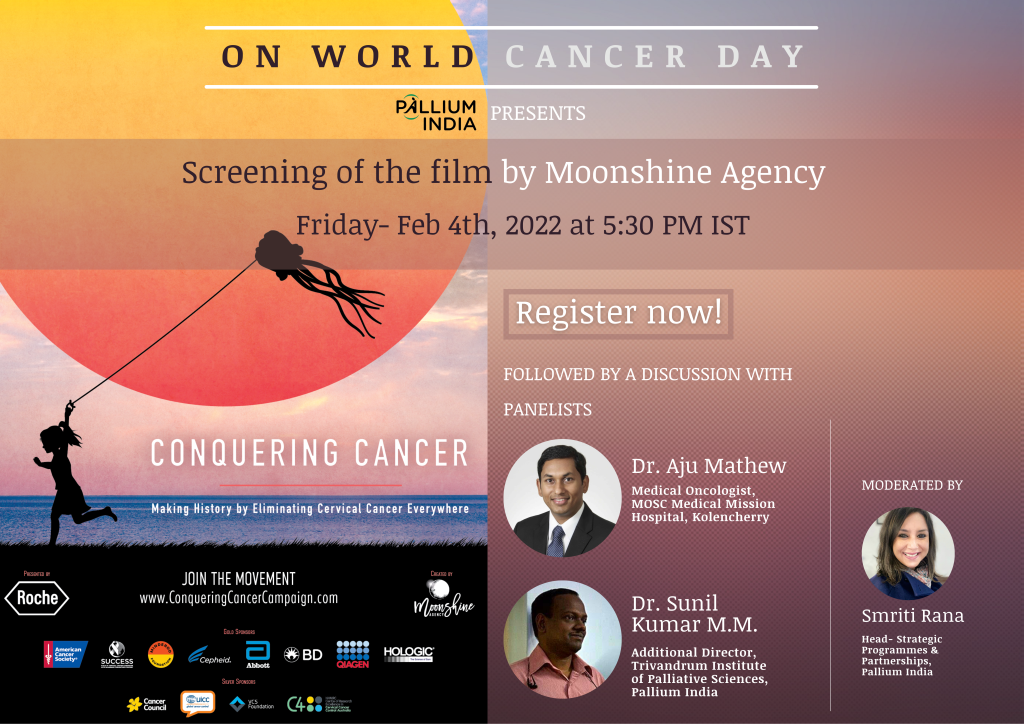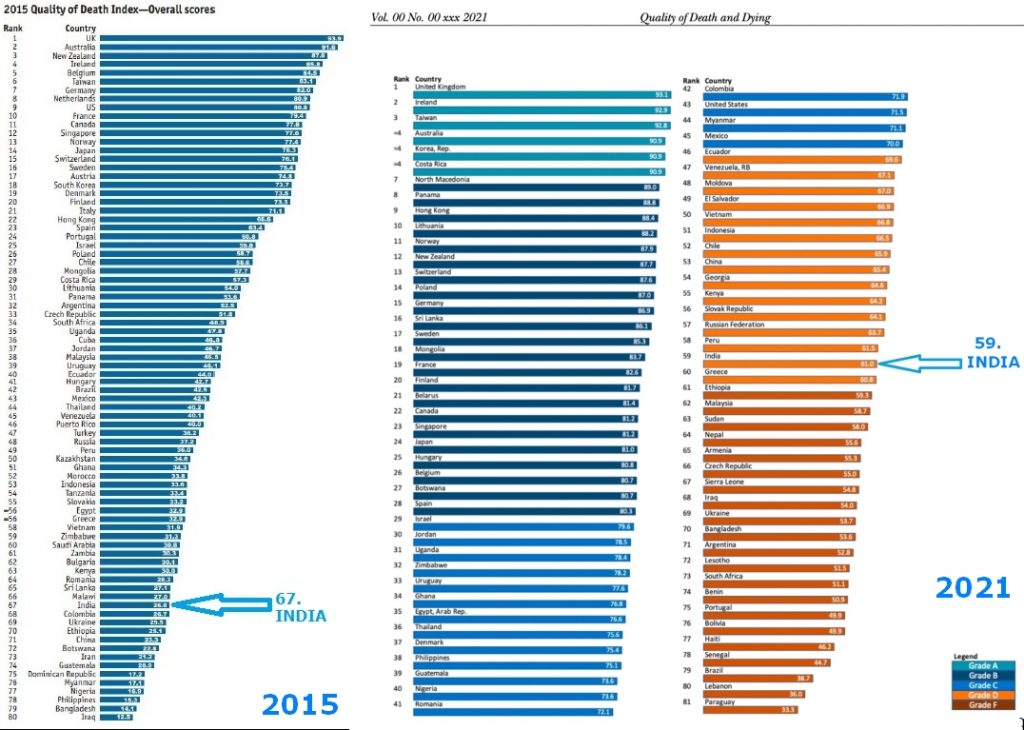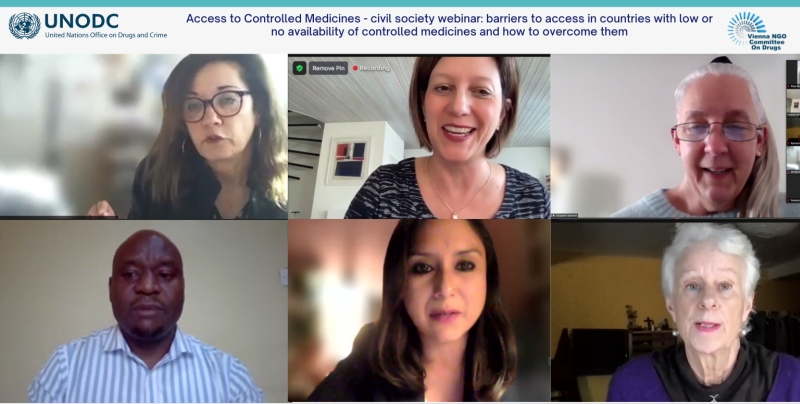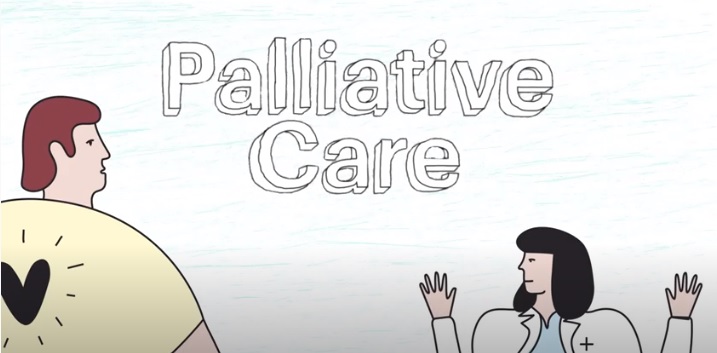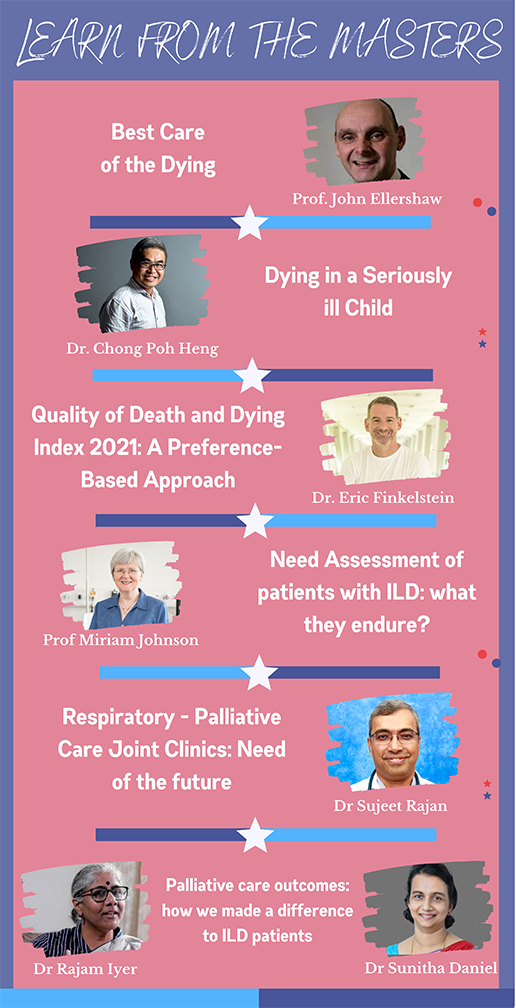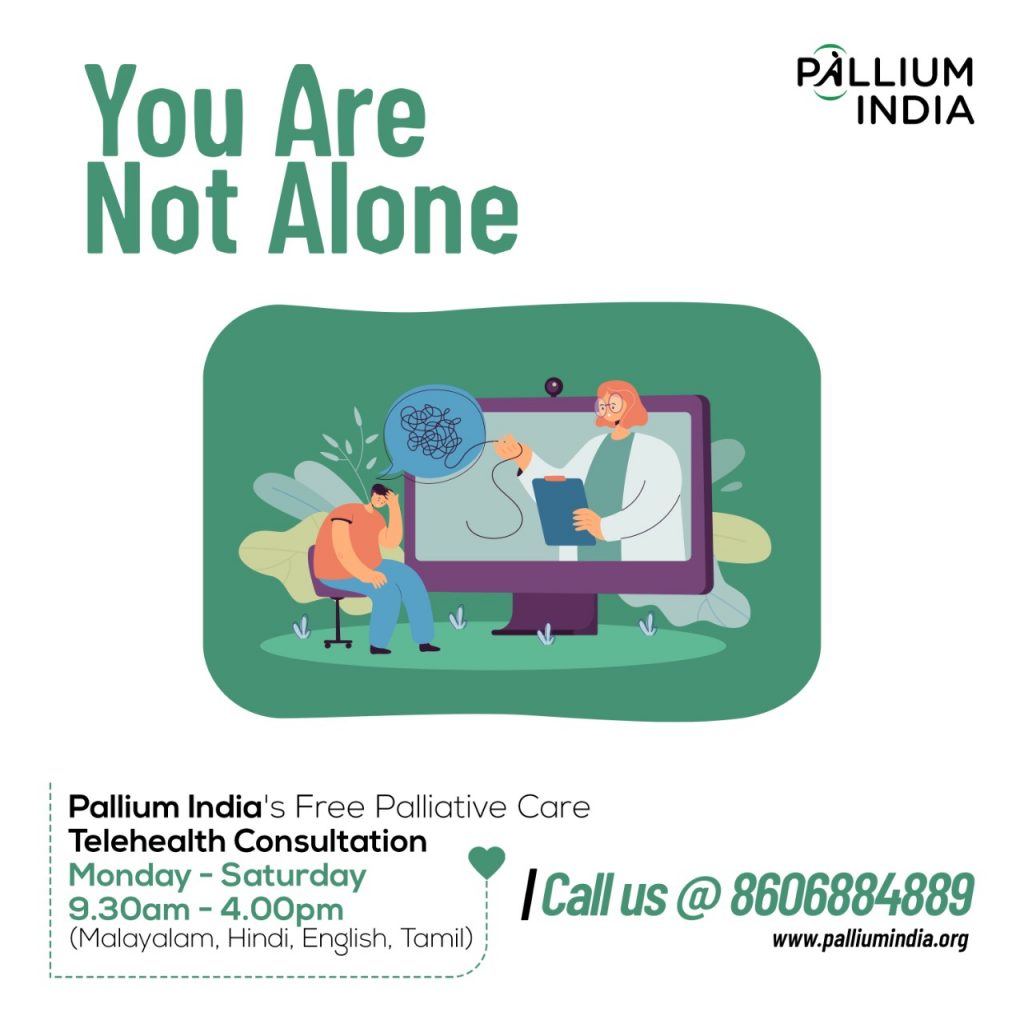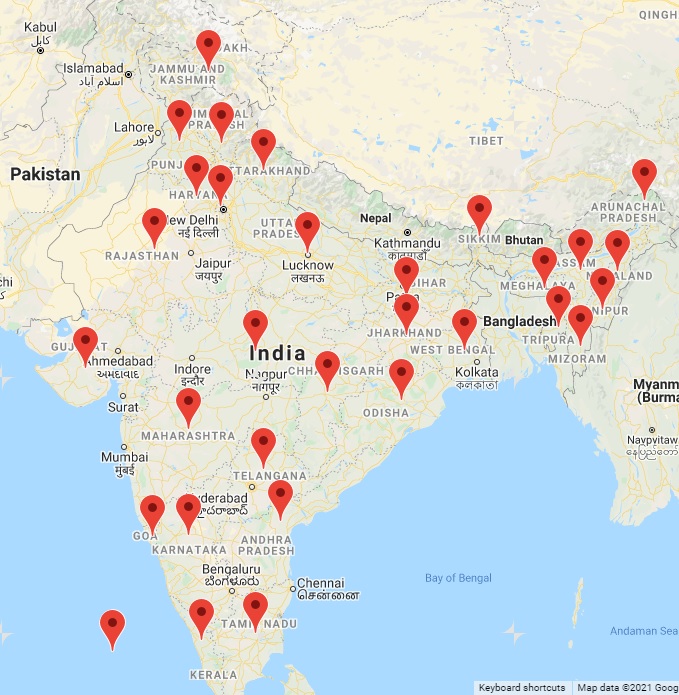February 2022

Click here to subscribe to our newsletter
Dear friends,
The huge burden of suffering due to cervical cancer in low and middle income countries is a shameful reality. Almost completely preventable by vaccination of adolescents, this disease continues to wreak needless havoc on tens of thousands of women in India every year.
Moonshine Agency (the makers of such movies as Life Before Death, Little Stars and Hippocratic) has come up with “Conquering Cancer“. They have made the screening of the movie free for viewers in Low and Middle-income countries (LMICs).
We screen “Conquering Cancer” on world cancer day, the 4th of February 2022. If you are from an LMIC, please register and watch, and take part in the discussion that will follow.
Please register: https://us02web.zoom.us/webinar/register/WN_qN42ERL_SCONfH5aXA0PPw
Watch the official trailer of Conquering Cancer: https://www.youtube.com/watch?v=Yb7K79_ELrQ
Lancet Commission on the Value of Death
The very thought of death scares us. Fear robs us of our reason. The result: we incarcerate our dying loved ones in intensive care units which to them, for all practical purposes, act as torture chambers.
This has to stop. The dying should have a farewell with dignity, compassion and love, as part of the family and community to the very end. Can we make this sea change happen?
27 experts from various fields around the world got together – in physical meetings in the UK and Italy and virtually for three and a half years – to work on evaluation of how people die in the modern world and how the transformation from ‘tamed death’ to the ‘forbidden death’ of modern times has caused suffering. The Commission’s report published on 01 February 2022 calls on healthcare systems, governments, civil society organisations to confront the current status of end-of-life care and turn it around to something that brings back the involvement of the community.
Please watch a 6-minute video on the report: A new vision for death and dying | The Lancet Commission on the Value of Death
The Commission’s report can be seen at https://www.thelancet.com/commissions/value-of-death
The hashtag for social media is #ValueOfDeath
Official virtual launch is on Feb 1 at 6:30 pm IST. Dr Raj Mani from India will be one of the speakers. Register here https://event.on24.com/wcc/r/3570304/7E94989E07296ED470E76EA01F886376
There will be a virtual conference on the Commission’s report at Royal Society of Medicine on Mar 1 at 2:30 pm IST. Dr M R Rajagopal, one of the commissioners, will be speaking at this event. Register here https://www.rsm.ac.uk/events/palliative-care/2021-22/plq04/
Also read:
Too many people worldwide dying bad death: Expert panel – The Telegraph
Kerala’s model of care transformed how people lived and died: Lancet Commission – The Indian Express
Lancet Commission calls for community model care for people dying – The Hindu
Experts warn of increasing over-medicalisation of death, call for rethink on end-of-life care – The Journal
Quality of death index
In 2015, Lien collaboration and Economist Intelligence Unit had got together to publish the ‘Quality of Death Index‘. India ranked 67th among 80 countries in the world.
Recently, Eric A. Finkelstein and colleagues have published a cross-country comparison of expert assessments of the quality of death and dying. India is 59th among 81 countries studied.
At one look, it would seem that India has climbed up in the ladder and has improved its position. We wish that were true.
Unfortunately, the two results are not comparable. The 2015 index was based on 24 different indicators of quality of palliative and end-of-life care in four domains. One of the domains was an environment conducive to improvement.
The 2021 report is based on an entirely different system of evaluation based on 13 indicators. The position of each country about the status on the 13 indicators was assessed by at least two experts in each country. The index is based on those experts’ perception.
Comparing the rank in the two publications hence, would be like comparing oranges and apples. So what message do we take from the 2021 report? The simple answer for India is that our end of life care is still abysmally bad. 59th position among 81 is certainly nothing to boast about.
Do we have an environment conducive to improvement? Well, yes. The fact that end of life care is included in undergraduate medical curriculum from 2019 and the fact that National Health Policy of 2017 includes palliative care are indeed promising developments for the future. But still, they would only be a small part of what needs to happen.
Perhaps we should look at this report in the light of the Lancet Commission Report on the Value of Death to be published on 31st of January 2022. Let us look forward to seeing that report and to its Indian release event as part of the annual conference of the Indian Association of Palliative Care during a session at Jaipur on 11 February.
Dr. Sushma Bhatnagar and Dr Savita Butola re-elected to lead IAPC
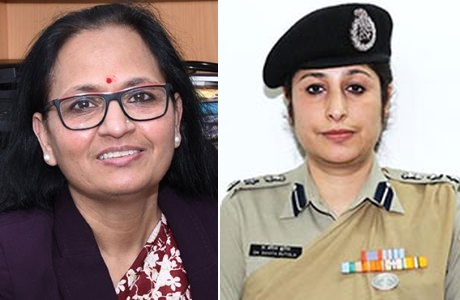
Dr. Sushma Bhatnagar has been re-elected as Indian Association of Palliative Care (IAPC) President for a three-year term. Professor and Head, Department of Onco-Anaesthesia and Palliative Medicine at the All India Institute of Medical Sciences, New Delhi, Dr. Bhatnagar has been a IAPC member for the last 23 years. She has published over 334 papers and attended more than 300 conferences at home and abroad.
Dr. Savita Butola, Chief Medical Officer in North Tripura Border Security Force, has been re-elected Secretary while Dr. Deepa Kerketta Khurana, Safdarjung Hospital, New Delhi has been elected Treasurer.
Elections were held virtually between January 21 and 23.
Others elected as Central Committee members are Dr. Nishkarsh Gupta and Dr. Sarita Singh (North Zone); Dr. Kabindra Bhaghabati and Dr. Sanghamitra Bora (North-East Zone); Dr. Rita Rani and Dr. Umesh Kumar Bhadani (East Zone); P. A. Mujeeb Kuttamassery and Dr. Seema Rajesh Rao (South Zone) and Dr. Jayita Deodhar and Dr. K. V. Ganpathy (West Zone).
Congratulations to the new office bearers.
The IAPC, a registered Public Trust and Society, was formed in Ahmedabad in 1994 in consultation with the World Health Organisation (WHO) and the Government of India as a national forum to connect, support and motivate individuals and institutions involved in palliative care. Since then, it has been working as the national umbrella organization for palliative care in India. It has over 2,500 registered life members which includes individual, institutional and overseas members.
Overcoming barriers to access to controlled medicines – a webinar for civil society
In a webinar jointly organized by UNODC Civil Society Unit (CSU)and the Vienna NGO Committee on Drugs (VNGOC), experts from UNODC and civil society presented UNODC’s Global Program on Access to Controlled Medicines and best practices in overcoming barriers to access. They highlighted the need for cooperation across all sectors, international organizations, governments, civil society, caregivers, and patients.
Mirella Dummar Frahi, Chief of the CSU and Heloisa Broggiato, Board member of the NGOs opened the webinar that gathered nearly 100 participants from around the world. Elizabeth Mattfeld, Global Coordinator of the Global Programme presented UNODC’s work on this topic and showed avenues for civil society to engage more effectively.
The first civil society expert Mark Mwesiga from Palliative Care Association Uganda introduced the situation in Uganda and how through joint efforts between the Government, law enforcement and civil society, access to controlled medicines in rural areas was improved significantly.
Smriti Rana from Pallium India shared how her organization works in Kerala, India to improve patient care through training and community engagement. Dr Katherine Pettus from the International Association of Hospice and Palliative Care concluded the presentations by stressing the importance of strong cooperation between governments and civil society.
You can view the recording of the event here: https://youtu.be/85Jlwc4G-TA
New training manuals for a palliative care revolution in India
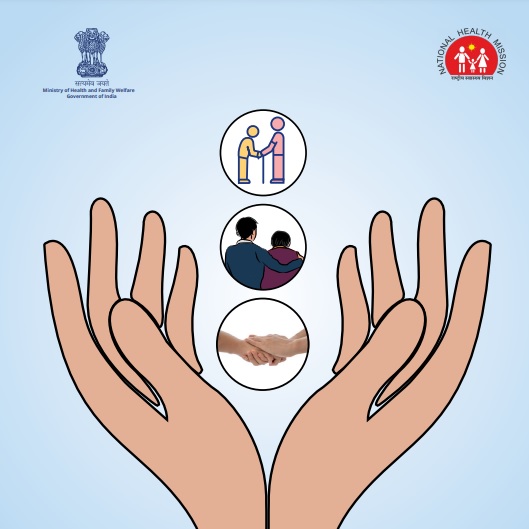
A silent revolution is on its way.
You might remember that the National Health Policy of 2017 included palliative care. The National Health System Resource Centre (NHSRC) of Government of India, in a massive fast-pace effort has created training materials to reach 50,000 family wellness centres at the national level. According to the plan, at least three professional healthcare providers from each of these places will be trained resulting in a massive empowerment programme for 150,000 of them.
In addition to these training manuals, the docket also includes educational videos, each of an average of five minutes duration.
Thank you NHSRC and the Ministry of Health of Government of India for allowing Pallium India to work with you. And we are grateful for the large number of experts in palliative care and geriatrics who came forward to make this happen at lightning speed.
Here are the links to these training manuals:
Training Manual on Palliative Care for ASHA
Training Manual on Palliative Care for Community Health Officer
Training Manual on Palliative Care for Medical Officer
Training Manual on Palliative Care for Multipurpose Worker
Training Manual on Palliative Care for Staff Nurse
Operational Guidelines for Palliative Care at Health and Wellness Centres
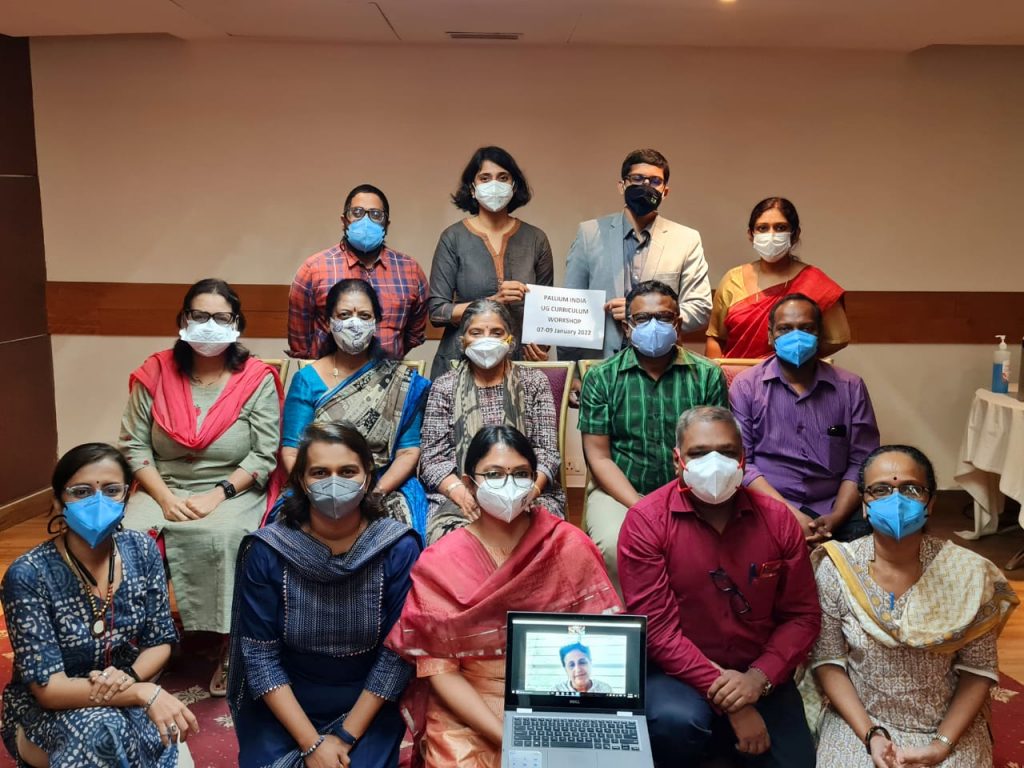
Pallium India conducted a workshop on “Integrating Palliative Care in Undergraduate Medical Education in India” at Thiruvananthapuram on 7th, 8th and 9th of January, 2022.
20 modules were developed as part of this program for possible integration into Undergraduate Medical Education for implementation of India’s 2017 curriculum.
17 faculty members from various parts of India, including palliative care experts and medical education experts, attended this workshop.
Video of the Month
What is palliative care and how can it be assessed? Video by the World Health Organization
Watch the video on youtube: https://www.youtube.com/watch?v=siXLjg0eiVs
Subscribe to Pallium India’s youtube channel for videos related to palliative care and our activities. You can watch previous webinars and training sessions, as well as listen to caregivers, survivors and others sharing their experiences.
Follow us on Social Media for updates
Contact us: [email protected] / 97467 45497
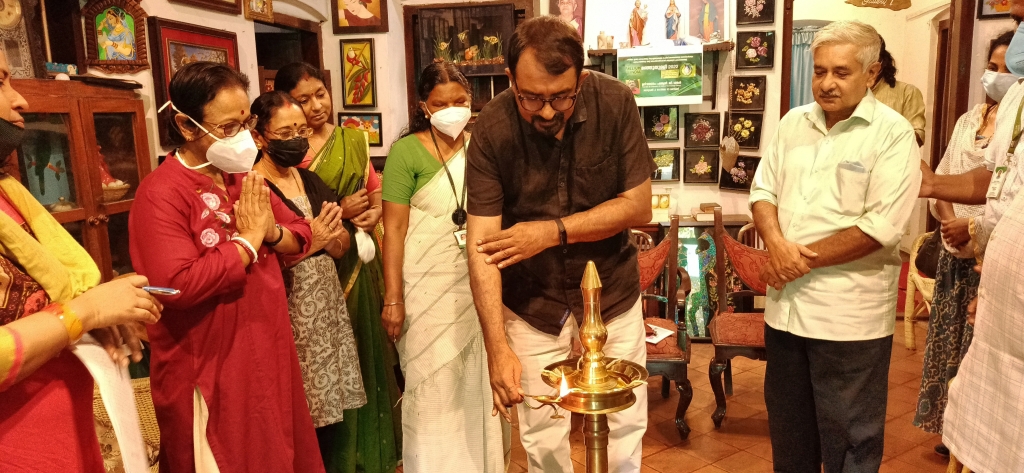
Manjuthulli 2022
Manjuthulli Art & Craft Exhibition and Sale was inaugurated on January 4, 2022 by G. Shankar, Padmashree awardee and Founder-Chairman of Habitat Technology Group.
The 5-day event was held at Flora Art Gallery, Ootukuzhy, Thiruvananthapuram, owned by artist George Fernandes.
Since 2014, Pallium India’s volunteers, staff and well-wishers have been organizing Manjuthulli Art / Craft exhibition and sale, to raise funds for the palliative care activities of Pallium India, including children’s education, free medicines, foodkits etc.
Upcoming Trainings & Events
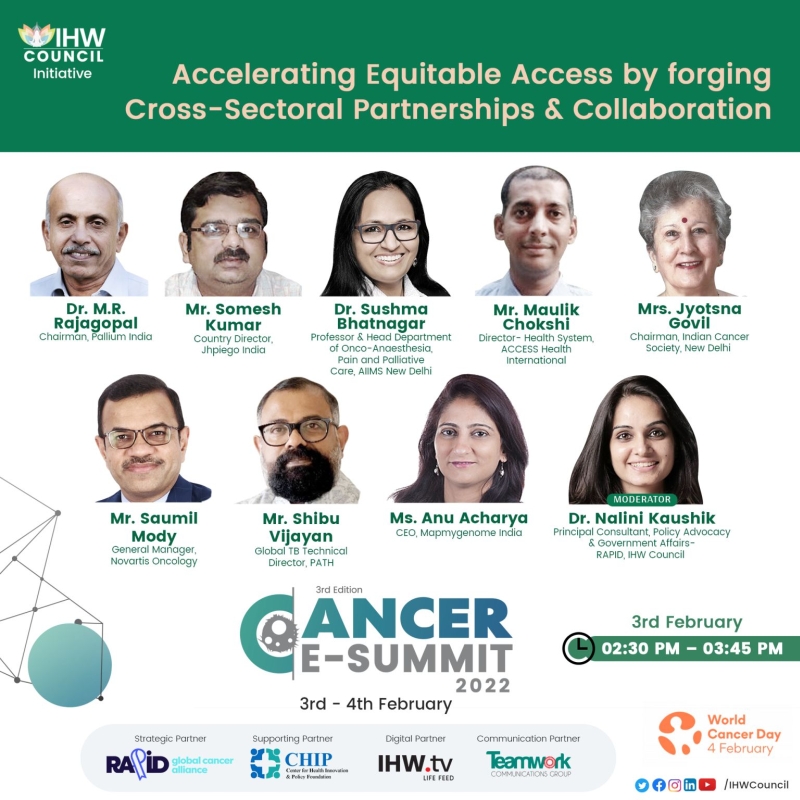
Click here to register for this event: bit.ly/3tmMUlE
Feb 4, 2022: World Cancer Day
Feb 4, 2022: Screening of the movie “Conquering Cancer” on World Cancer Day
Feb 3-4, 2022: Cancer E-Summit
Feb 11-13, 2022: IAPCON 2022
Feb 14, 2022: FREE Volunteer Training Program (Online) – English
Feb 15, 2022: International Childhood Cancer Day
Feb 15, 2022: Essentials of Palliative Care for Physiotherapists
Feb 28, 2022: Online Foundation Course in Palliative Nursing (FCPN) – ECHO
March 7, 2022: Online Foundation Course in Palliative Medicine for doctors (FCPM) – ECHO
IAPCON 2022 to be held from 11 to 13 February, 2022
The 29th Conference of Indian Association of Palliative Care (IAPCON 2022) will be a virtual conference held between 11th and 13th February, 2022.
The theme of the conference is “Towards Excellence and Equity in Palliative care“.
There will be a pre-conference workshop on Thursday, 10th February, 2022.
Registrations are open for Annual IAPC debate, ‘Expressions: An arena for creative expressions’, Quiz etc. Register now
For more information on the conference, please visit the IAPCON website: https://iapcon2022jaipur.com/
Check out all upcoming trainings and important days: https://palliumindia.org/events
Contact: [email protected]
OPENINGS
PALLIUM INDIA, TRIVANDRUM
AZIM PREMJI FOUNDATION
Pharmacist, Bengaluru
Nurse, Bengaluru
Medical Officer, Bengaluru
EASTERN INDIA PALLIATIVE CARE
Palliative care nurse, Kolkata
DEAN FOUNDATION
Palliative care physician, Chennai
CACHAR CANCER HOSPITAL & RESEARCH CENTRE
Palliative Care Physician, Silchar
VISIT OUR CAREERS PAGE:
https://palliumindia.org/category/career
In case of queries, please write to us: [email protected]
Palliative Care in Nagaland
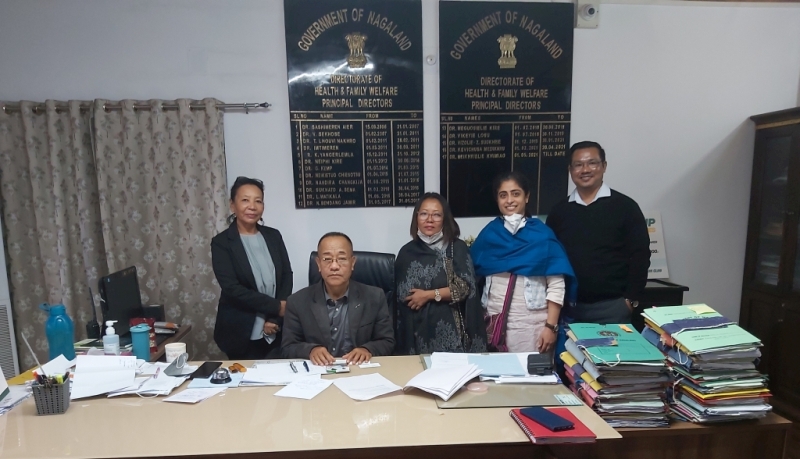
Rontu Sangma, Regional Coordinator NE, State Facilitation, Pallium India, writes:
Palliative Care services in Nagaland began in 2013, to provide quality of life to people suffering from cancer, as the State began recording a relatively high prevalence of cancer when compared to other states. There are a few doctors and nurses who are trained in palliative care, in the state.
Palliative Care services are being provided at the Naga Hospital (NHK) at Kohima, Christian Institute of Health Sciences and Research (CIHSR) at Dimapur, Eden Medical Centre at Dimapur (IP, OP and Home Based Palliative Care) and in a few other hospitals.
Click here to view the list of palliative care centres in Nagaland
(Image, From left: State Nodal Officer Dr Vinotsole Khamo, Principal Director Dr Neikhrielie Khimiao, Palliative Care in-charge of Naga Hospital Dr Lalkrawsthangi Khalo, Shalini AJ & Rontu Sangma)
Currently there is no State Palliative Care Policy in Nagaland but it is encouraging to see that a group of committed palliative care doctors have come together to provide palliative care services using the locally available resources. 3 of Nagaland’s 12 districts currently have access to Palliative Care. Plans are underway to increase coverage to other districts by motivating private practitioners and by training health care professionals within the public health system to actively implement palliative care in the primary health care centers in each district.
A Meeting on National Program for Palliative Care (NPPC) in Uttarakhand
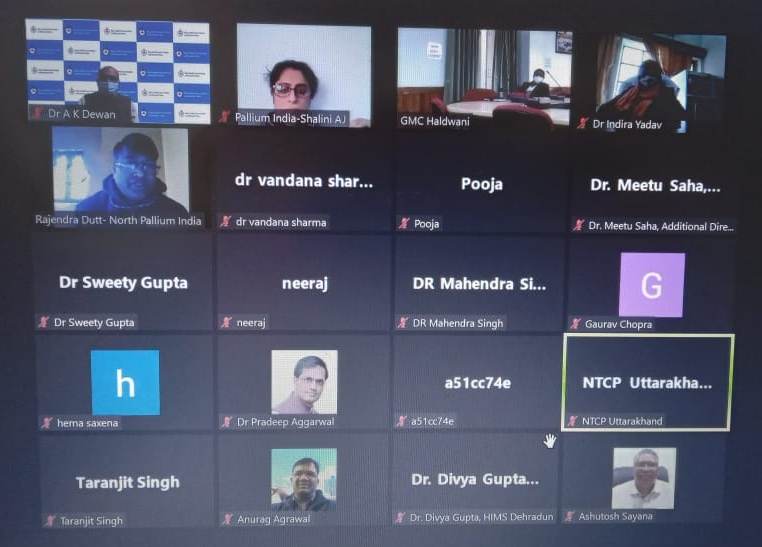
Rajendra Dutt Bijalwan, Regional Coordinator – North, State Facilitation, Pallium India, writes:
A virtual meeting on Implementation of National Program for Palliative Care (NPPC) was organized jointly by NHM Uttarakhand and Pallium India, on 21st January, 2022.
Mr Neeraj (District Drug Inspector, Dehradun) attended the meeting. Dr. Meetu Shah (Additional Director, Medical Care, DG Health Dehradun), Team of State Palliative Care Cell, NHM Uttarakhand, Dr AK Dewan (Ganga Prem Hospice, Rishikesh), Ms. Shalini AJ (Head State Facilitation, Pallium India) and Mr. Rajendra Dutt Bijalwan (Regional Coordinator, Pallium India) were present in the meeting.
Palliative Care Champions from AIIMS Rishikesh, Government Medical College, Dehradun, Shrinagar and Haldwani were also part of the workshop.
The agenda included discussions on developing a Palliative Care Policy at State Level and Government of India (GOI)’s guidelines, establishing palliative care facility in every district of the state, training of doctors and staff nurses for pain management under palliative care, Procurement, Storage and Distribution of opioids drugs for Palliative Care, etc.
We are excited by the developments in Uttarakhand and look forward to continued collaboration.
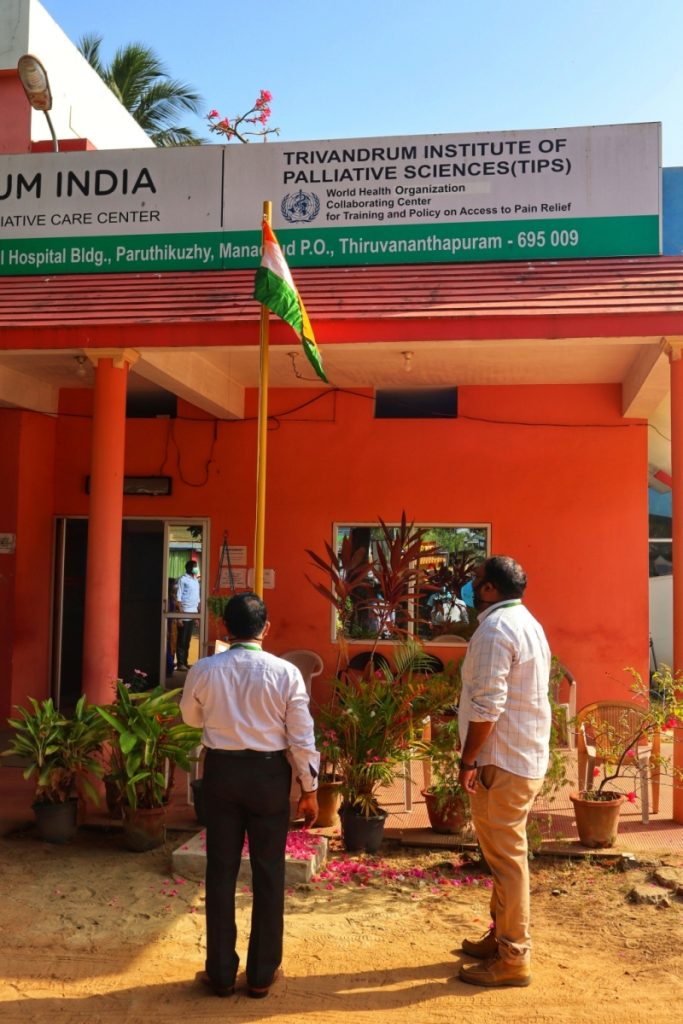
Pallium India celebrated India’s 73rd Republic Day on Jan 26, 2022, adhering to strict covid protocols.
Mr Kishore Kumar S. (Head – Human Resources) and Dr Arjun (Section Head – Medical Services) hoisted the National flag.
Doctors, nurses and other staff on duty were present.
“It is the people, the people, the people.”
In her op-ed in the Hindustan Times, Involvement of people living with non-communicable diseases, Ms Radhika Shrivastav, who leads the Healthy India Alliance (the Indian arm of the NCD [Non-Communicable Diseases] Alliance), and others write, “Community participation and empowerment is an important best buy for achieving equitable, people-led health care and palliative care. The Alma-Ata Declaration on primary care emphasised that communities have a right and responsibility to be involved in their health.”
Indeed. Involvement of people living with NCDs (PLWNCDs) would be fundamental to matching actions of health systems to people’s needs on the ground. The Astana Declaration of 2018 asked member countries of the UN to give control over healthcare to the communities. But we are a long way away from that. Thank you Ms Radhika Srivastava and team for this op-ed. We shall look forward to working with you on a national project to achieve this.
Click here to read the article: Involvement of people living with non-communicable diseases
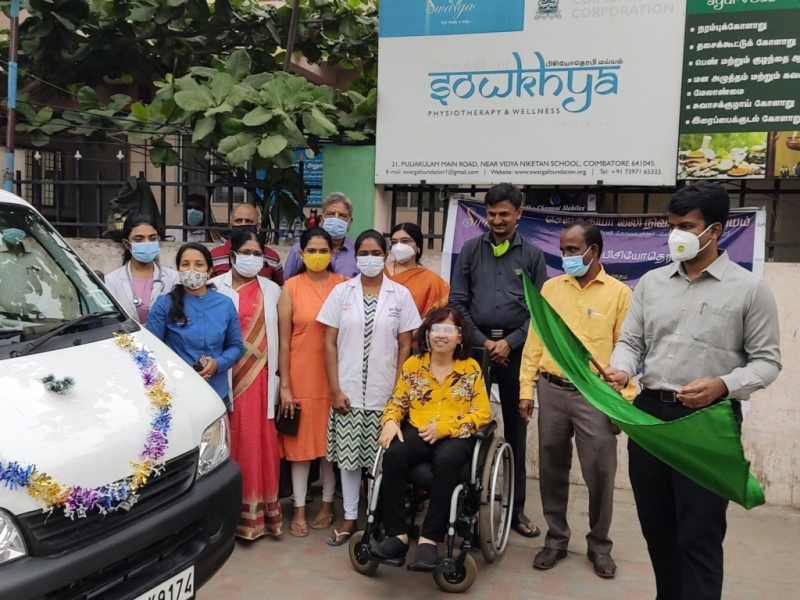
Swarga Foundation’s new home care program
In 2009, Swarnalatha, a 29 year old managerial executive at an MNC in Bengaluru and a mother of a two year old boy developed persistent high fever. She got the diagnosis of Multiple Sclerosis (MS), a debilitating disease which causes loss of mobility. The disease shattered all of Swarna’s personal and professional aspirations; but she rose from the depths and, with the support of her husband, T S Guruprasad, set up Swarga Foundation.
Pallium India is proud to collaborate with Swarga Foundation as their training and knowledge partner in a new home care program, which provides palliative care services for persons with disabilities. On Thursday, January 6, 2022. Sri. Raja Gopal Sunkara I.A.S., Commissioner of Municipal Corporation of Coimbatore flagged off the project from Sowkhya Pain Rehab Clinic.
A team comprising of a doctor, nurse, psychologist and physiotherapist visit patient’s homes and provides basic health care, physiotherapy, catheter change, pressure sore management and hygiene, psycho-social support and counseling for families.
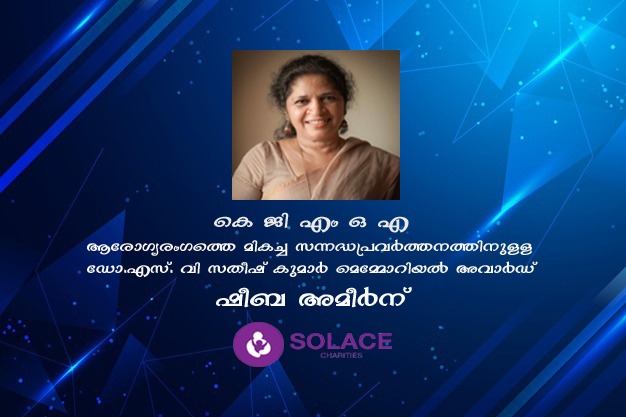
Congratulations, Sheeba Ameer!
We are so proud to see that Sheeba Ameer, the founder-chair of “Solace” has been awarded the Dr. SV Satish Kumar Memorial award by Kerala government medical officers Association.
The humane service rendered by Solace for children with cancer and their families has won global appreciation.
Care Beyond Cure
Dr. Molly Thomas, Consultant Dermatologist and Palliative Care Physician, Herbertpur Christian Hospital, Uttarakhand, writes:
“I was introduced to palliative care in 2021 through the FCPM (Foundation Course in Palliative Medicine) conducted by Pallium India. Awareness of palliative care services is very minimal and access to palliative care is very challenging in our hilly state of Uttarakhand. It was a very timely eye-opener to me regarding the quality of care that every doctor is expected to deliver irrespective of their specialty.
I was able to see the glaring lacuna in our understanding, and delivery of health care as taught us in the medical colleges, where thrust, prominence and skill development were placed on diagnosis and cure, which unfortunately is not the only expertise we have. We were reminded rightly that we may not be able to cure but we can always comfort.
Journeying with the person, giving them the dignity which they truly deserve is what many of our patients expect even when they know that their disease is incurable. The concept of “totality of pain”, taking into consideration not just the physical pain which is mostly amenable to drugs but also the psycho-social aspect, was a very new understanding which has created a paradigm shift in my approach to patients.
This learning was very helpful to me in journeying with patients like a 32 year old man who suffered from traumatic paraplegia as a result of a freak accident, a few years ago. He had very deep pressure sores which made life difficult for him and his young family consisting of his wife and two children. Through palliative care, his wife received training to nurse the husband and we explored the possibility for vocational rehabilitation and procuring a disability certificate which was taking a long time. He understood that we cared and would do our best to extend whatever possible help we could provide. I am glad to have had the opportunity to be trained by very eminent faculty of Pallium India. I am also grateful to Pallium India for the guidance provided to kickstart palliative care services in Herbertpur Christian Hospital (HCH) via a zoom meeting attended by our higher authorities and Pallium India faculty, in last December. Mr Rajendra Dutt Bijalwan of Pallium India was instrumental in organising this meeting and continues to be a very resourceful person for beginning palliative care services at HCH.”
Way to go, Sangwari!
It was truly a delightful experience to go through the newsletter sent by our collaborator and palliative care physician Dr Shilpa Khanna from Sangwari from Chhattisgarh.
In about 8 pages or so, the newsletter gives us a snapshot of rural India, the need for equitable healthcare and how a handful of committed human beings make a difference. There is certainly nothing condescending about what they do. See the image of villagers constructing the clinic? Sangwari is not working “for” them. Sangwari is working WITH them.
All at Sangwari, may your tribe increase!
Persistence of Purpose: The incredible results of one doctor’s advocacy
“The pediatric palliative care we see is not standard: we see patients who are much beyond the textbook description. They are not at the traditional ‘end-of-life,’ but these are children who are suffering.” Dr Gayatri Palat says.
Rapid spread of Omicron showing “tale of two pandemics: rich and poor”‘
“You hear people say: ‘Why are you worried about Omicron? If you’re healthy and young, it’s no problem, it’s just a cold.’ And … that’s completely dismissing the reality of millions of people in this country.”
How I helped my mother to have a good death from afar
Due to the COVID-19 pandemic, Melbourne-based V Srikanth had to support his mother in India from afar as she neared the end of her life. This is what he learned.
Third year of a pandemic: What are the mental health implications?
After living in a pandemic for so long, you might be exhausted, weary, and fed up. The additional uncertainty of Omicron might be adding even more stress to you. Please know that you are not alone,and it is hard for a lot of people these days, but together we can and will get through this.
Patients and families from anywhere in India can call Pallium India’s Telehealth helpline. Health care professionals who need advice on palliative care or pain management can call this number.
The service is FREE and available in English, Hindi, Malayalam and Tamil.
Our lines are open from Monday to Saturday 9:30 a.m. to 4pm
Call: +91 860 688 4889
In case of queries, please write to us: [email protected]
Pallium India maintains a state-wise directory of institutions offering palliative care services in India. The list includes palliative care providers from community-based organisations to tertiary care institutions and cancer care centers.
The directory covers critical information like contact details including phone numbers and email addresses, availability of In-patient, Out-patient and home care services, availability of morphine, etc.
If anyone you know needs palliative care support, our directory will help you find the centre closest to you. Do take a look at Pallium India’s Palliative Care Directory and let us know (Email: [email protected] or Contact us) if any centre near you is missing.
Click here to donate to Pallium India and lend a hand to our activities.
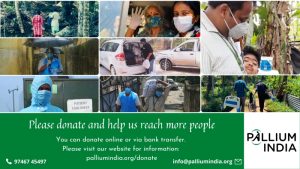
Donations from US can be made online on http://palliumindiausa.org/
For DOMESTIC Transfer:
Beneficiary: Pallium India Trust
Account No: 30086491915
State Bank of India
Branch: Pattom, Trivandrum
IFS Code: SBIN0003355
MICR No: 695002007
For FOREIGN donations:
Account Name: Pallium India Trust
Bank: State Bank of India (code: 00691)
Branch: Delhi
Account No: 40098265669
IFSC Code: SBIN0000691
SWIFT Code: SBININBB104
Queries? Write to [email protected] or call 97467 45504
Follow us for palliative care news, views and updates – as & when they happen
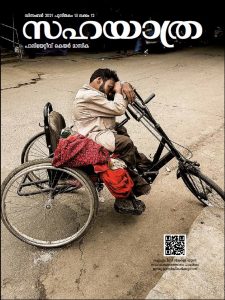
SAHAYATRA
Sahayatra, Pallium India’s monthly print magazine in Malayalam, is meant for anyone interested in Palliative Care – patients, families, palliative care professionals, volunteers and well-wishers.
Yearly subscription rate for Sahayatra is ₹200. (Only ₹500 if you subscribe for three years.) However, we send Sahayatra free of cost to patients and their families.
To subscribe to Sahayatra monthly magazine, please send your complete postal address to [email protected]. Contact: 97467 45504
Read previous issues of Sahayatra online: https://palliumindia.org/sahayatra
PARTING SHOT
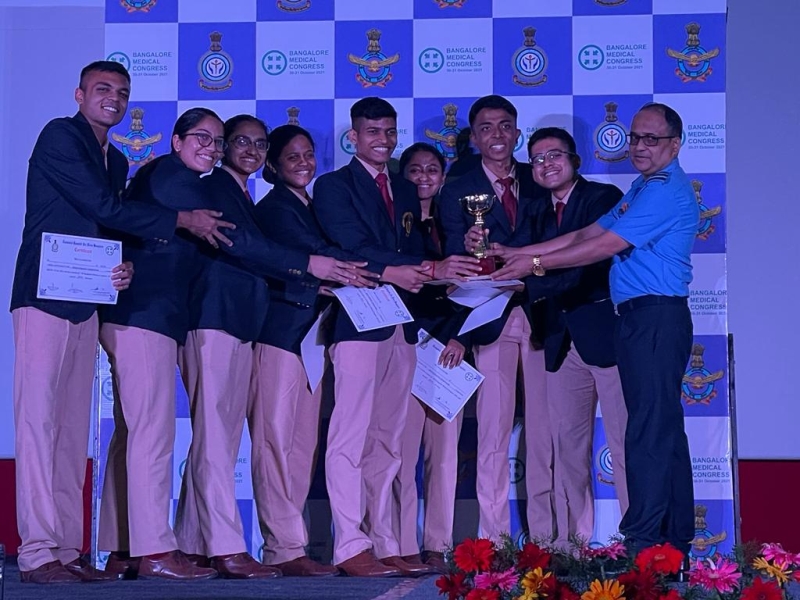
Palliative Care: Perspectives from a Journey
Aishwarya Aiyer, Medical Cadet, Armed Forces Medical College, Pune, writes:
It all started with the BMC (Bombay Medical Congress hosted by INHS Ashvini) deadline looming over us like the sword of Damocles. “What do we do, what do we do?” we’d wonder each day. We were looking for pressing and impactful problems that we could tackle at our level as undergraduates.
“Why don’t you try something in Palliative Care?” said our mentor, not at all surprising since he’s an oncologist.
At first we were stumped. Our perception about palliative care was that it was end of life care, that it was only for people on their deathbeds, for whom modern medicine could do no more than provide crude respite.
But boy, were we wrong.
The more we studied the more we realised how the need for palliative care was so pervasive and yet grossly under-appreciated. The numbers are truly shocking. Palliative Care is for anyone suffering from an illness, regardless of the prognosis, and extends well beyond the physical sphere to involve other aspects of health and wellbeing. It opened our eyes to the lacunae and shortcomings of the current system of healthcare.
Published literature and our own studies confirmed how palliative care could improve quality of life; an improvement so dramatic, it was clear as day in the patients of Vishranthi, a palliative care centre in Pune.
Any mention of Palliative Care is incomplete without Pallium India, and we had the honour of speaking with Dr. M R Rajagopal, Founder-Chairman of the organization. His insights were definitely valuable, but what struck us most was his commitment and passion toward palliation. His belief and drive strengthened our own and probably allowed us to portray the same emotion to a larger audience.
We presented a symposium on palliative care at the Bangalore Medical Congress organised by Command Hospital Air Force, where we won the first prize; but the real achievement was being able to portray the palpable need of integrating palliative care into existing healthcare. We were especially happy that it was acknowledged by the senior officials there.
Our studies focused on identifying unmet needs and the extent of palliative care requirements in patients suffering from life threatening illnesses. We’re grateful to have had our work recognised at several national and international conferences.
In the course of our project we also laid the groundwork of setting up a palliative care centre at our own hospital.
Our journey and the experiences it bore were all the more inspiring. As we grow into our roles as health care providers, we hope to inculcate palliative skills into routine clinical practice. So that someday we can recognise the tremor in a patient’s voice or the lines of worry on their face and respond with empathy and compassion. There’s still a long way to go but understanding these core values of compassion, empathy and palliation is a step forward to heal the world- one smile at a time.
Medical Cadets: Aishwarya Aiyer, Vedant Shekhar Jha, Veeranjan Chamoli, Sowparnika R Nair, Arshiya Duhan, Jaiprakash Gurav, Udyangshu Saha, Sushmita Das, AFMC, Pune
Mentor: Group Captain (Doctor) TVSVGK Tilak MD (Med) DNB (Med) DM (Medical Oncology) FRCP (Glasg) Professor (Med) & Medical Oncologist, Department of Internal Medicine, AFMC, Pune
Thank you for reading our newsletter. Read previous issues here
Subscribe to receive our monthly newsletter via email: https://www.freelists.org/list/palliumindia
Have feedback? Let us know. Write to us: [email protected]


